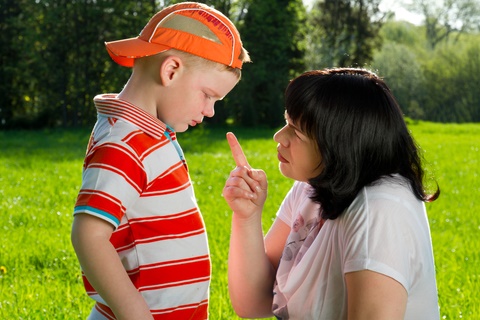
The best way to understand why we are the way we are today – is to look back at our early childhood and to scrutinize what exactly happened. Just like animals, when we are born, we are placed with our first “herd”. This first herd can be as tiny as a single parent and a child, or it could be huge – like two parents with many children, and grandparents living together. Regardless of the size, we need our first herd for survival. Small children have no problem recognizing family adults as leaders. After all, children are small and fragile while adults are tall and strong – no conflict there.
As a baby, your brain is like a spider-web with gazillions of connections, which are growing every day. This and other phenomena were well-studied by the scientists even back in the 20th century. Our parents did not know about the super-exciting finding the scientists made about children’s’ brains – they emit a special type of electromagnetic waves. That’s right. Waves don’t just happen in microwaves and oceans. Our brains make waves too! In the lab, they hooked up special electrodes to kids’ heads and read these waves with the special device called EEG, and a striking pattern emerged. If it’s a newborn or a toddler up to 2 years of age – you record mostly Delta waves, very slow waves, which occur in adults only when they are asleep. This means that babies before 2 years of age are essentially asleep with their eyes open. And that makes sense – you passively sleep, eat, pee and poop, and learn to walk and play with the objects, under the watchful eyes of your first herd – your family.
If you hook up the same kind of electrodes to the head of a slightly older child – from 2-6 years of age, you will record a completely different picture – mostly Theta waves – the same waves my adult hypnosis patients are giving off. As stunning as it sounds, folks, your 2-6 years olds are walking around in a hypnotic trance. This explains a lot. You often say to a child: “Please pick up your stuff!” ten times in a row, and sometimes have to raise your voice to get your kid’s attention. If we think of our development in terms of survival, the hypnotized brain of the 2-6 year old makes sense.
This is when the knowledge and know-how are being transferred from the elderly animals to the youngest in the herd. However, this also means that whatever you teach them from 2-6 years of age, will become so sealed in their deepest parts of the brain, forming a subconscious mind, that no-one and nothing will be able to undo that. These are your child’s first lessons of good versus evil. This is their time to understand kindness versus cruelty, and so much more.
So, your princes and princesses now enter a preschool and all of a sudden, their clustered world undergoes a huge transformation. Now the second “herd” emerges: a pre-school class or a kindergarten class, with a teacher as an adult in charge. Classroom is where teachers rule and your kids instantly sense a new leadership, and their brains adjust to accommodate to this new half-day or full-day authority. When we were growing up, there were few day care opportunities, and we used to spend much more time with our first herd – our family, than today’s kids.
Equipped with these findings about children’s brain development, which our parents did not know, we can ask ourselves as parents or grandparents: Is a “secondary herd” (a babysitter, a kindergarten, or a school) teaching my 2-6 year old child or grandchild the right things? After all, they are molding my child’s hypnotized brain most of the day, five days a week. Do I like what information my child is exposed to?
The information which populates these young brains at this critical stage in development will determine much of their future choices in life. In my practice, one of the consequences I have to deal with in adults is their less than optimal eating habits. Due to the unique property of early childhood brainwaves, it would have been so much easier to instill healthy eating habits in childhood, than to try to build them in adulthood. Naturally, other foundations are being cemented into the children’s brains at this critical age as well: politics, a person’s role in a society, the views on sexes, world view, and just about everything else.
Our parents most likely did not know about the brainwaves of young children, but now that we are equipped with this information, we have to face the hard truth: either we spend more time molding these minds or someone else will.







